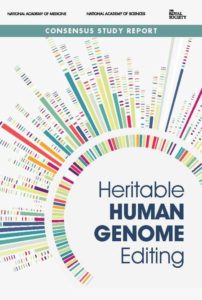 The National Academy of Medicine, the National Academy of Sciences, and the Royal Society released a new report, Heritable Human Genome Editing, on September 3, 2020.
The National Academy of Medicine, the National Academy of Sciences, and the Royal Society released a new report, Heritable Human Genome Editing, on September 3, 2020.
Clinical use of heritable genome editing should not be considered until it’s established that precise genomic changes can be made reliably without introducing undesired changes — a criterion not yet met by any genome editing technology, according to the report, written by an international commission convened by the three organizations. Heritable genome edits can be passed down to future generations, raising not only scientific and medical considerations but also a host of ethical, moral, and societal issues.
The commission — comprising 18 members from 10 nations — was tasked with developing a framework for scientists, clinicians, and regulatory authorities to consider when assessing potential clinical applications of heritable human genome editing. The commission’s goal was to define specific criteria and standards that would be required before heritable human genome editing could be considered for clinical use. The report will inform the World Health Organization’s expert advisory committee on human genome editing, which is developing appropriate governance mechanisms for both heritable and non-heritable human genome editing research and clinical uses.
Learn more about the report here, or read the full press release here.
